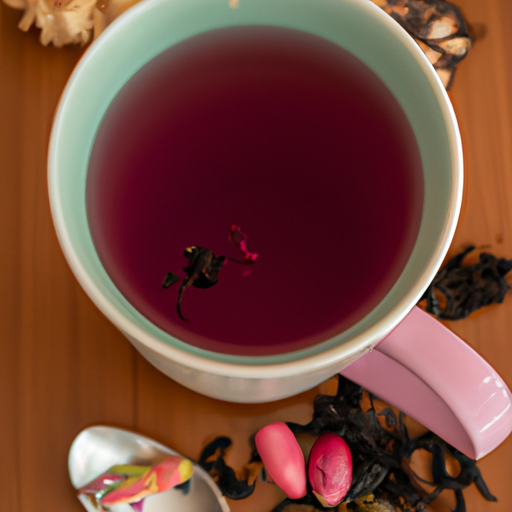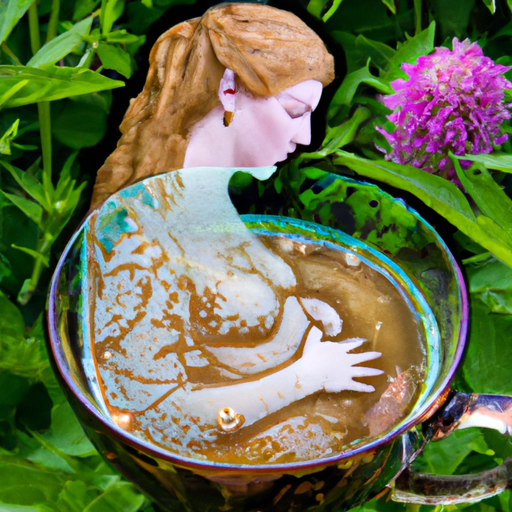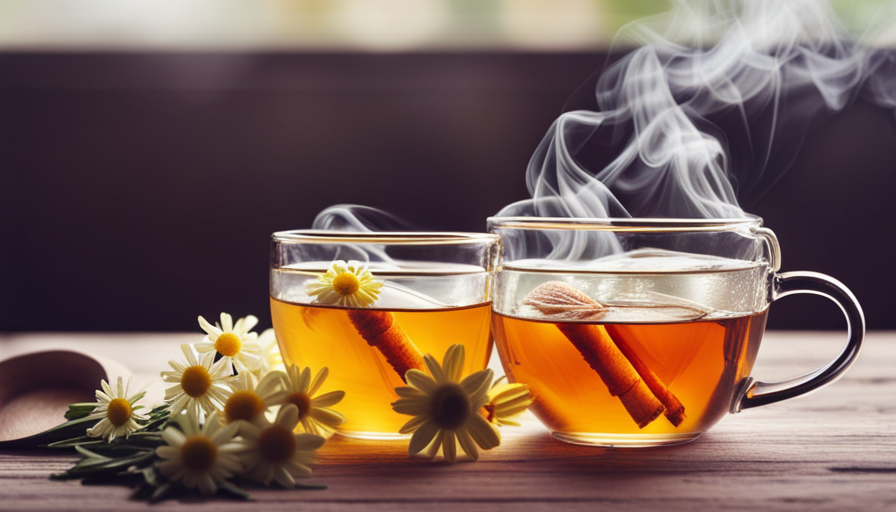I have always believed that nature is the key to healing. It is true that Earth gives us all we need to flourish and achieve harmony. Herbal tea has been a popular remedy for headaches for many years.
The power of plants and their ability to soothe and heal is truly remarkable.
So, if you’re wondering what kind of herbal tea you should drink for a headache, you’re in the right place. I’ve done my fair share of research and discovered some amazing options that can provide relief in a natural and holistic way.
From the refreshing and invigorating aroma of peppermint tea to the calming and soothing qualities of chamomile tea, there’s a herbal remedy for every type of headache.
In this article, I’ll guide you through a variety of herbal teas that have been known to alleviate headaches. We’ll explore the benefits of ginger, lavender, lemon balm, feverfew, and willow bark tea.
Each of these teas has its own unique properties that can help target different types of headaches.
So, sit back, relax, and let’s dive into the world of herbal tea for headache relief.
Key Takeaways
- Peppermint tea can soothe headaches with its cooling effect and muscle relaxation.
- Chamomile tea has anti-inflammatory benefits and can help with stress-related headaches.
- Lavender tea has calming and relaxing properties, relieving tension and promoting calm, making it a good choice for headache relief.
- Ginger tea has powerful anti-inflammatory properties and can improve blood flow, reducing tension and headache symptoms.
Peppermint Tea
If you’re looking for a natural remedy to soothe that pounding headache, why not try sipping on a refreshing cup of peppermint tea? Peppermint has been used for centuries for its medicinal properties, and it’s no surprise that it can help alleviate headaches. The menthol in peppermint has a cooling effect that can help relax muscles and relieve tension in the head.
Peppermint tea offers a range of benefits beyond headache relief. It can aid digestion, reduce nausea, and even freshen breath. To make peppermint tea, simply steep a handful of fresh peppermint leaves in hot water for about 5 minutes. You can also add a squeeze of lemon or a teaspoon of honey to enhance the flavor.
If you’re feeling adventurous, there are various peppermint tea recipes you can try. You can mix it with other herbs like chamomile or lavender for a soothing blend. Or, you can combine peppermint tea with green tea for a refreshing and energizing drink.
Now, let’s move on to chamomile tea, another herbal remedy that can help with headaches and promote relaxation.
Chamomile Tea
Chamomile tea is one of my go-to herbal remedies for headaches. It’s calming and relaxing properties help to soothe both my mind and body, making it an ideal choice for relieving stress-related headaches. Additionally, chamomile tea also offers anti-inflammatory benefits. This can further help to alleviate any discomfort or pain caused by my headache.
Calming and Relaxing Properties
For a headache, you should try lavender tea, which has been shown to have calming and relaxing properties. It helps to ease tension and promote a sense of calm. Lavender is well-known for its soothing effects on the mind and body, making it a perfect choice for those seeking relief from headaches.
Sipping on a warm cup of lavender tea while listening to calming music or practicing meditation techniques can create a serene environment that encourages relaxation. Lavender tea can help alleviate stress and anxiety, two common triggers for headaches. By incorporating this herbal remedy into your routine, you can effectively relieve stress-related headaches and find comfort in its gentle embrace.
Soothing both the body and the mind, lavender tea is a natural solution for achieving headache relief.
Relieves Stress-Related Headaches
Lavender tea effectively alleviates stress-related headaches by promoting relaxation and reducing tension. When I feel the onset of a stress headache, I reach for a cup of this soothing herbal tea. Here are four relaxation techniques and natural remedies that lavender tea offers:
-
Aromatherapy: Inhaling the calming scent of lavender tea can help ease tension and promote a sense of calm.
-
Muscle Relaxation: The active compounds in lavender tea can relax muscles, relieving the tightness often associated with stress headaches.
-
Sleep Aid: Drinking lavender tea before bed can improve sleep quality, reducing the likelihood of waking up with a headache.
-
Stress Relief: Lavender tea has been shown to reduce stress levels, which can help prevent stress-related headaches.
By incorporating lavender tea into my routine, I’ve found relief from stress headaches.
Moving on to the next section, let’s explore the anti-inflammatory benefits of herbal teas.
Anti-inflammatory Benefits
To experience the soothing effects of herbal teas, you’ll be delighted to discover the anti-inflammatory benefits that can help alleviate discomfort and promote overall well-being.
When it comes to relieving headaches, incorporating anti-inflammatory herbs into your diet can be a natural and effective approach. An anti-inflammatory diet focuses on consuming foods that reduce inflammation in the body, and herbal teas can play a crucial role in this.
Chamomile tea, for example, is known for its calming properties and can help reduce headaches caused by stress. Peppermint tea, on the other hand, contains menthol, which acts as a muscle relaxant and can provide relief for tension headaches. These herbal remedies are gentle on the body and can be a great addition to your headache relief routine.
Now, let’s transition into the next section and explore the benefits of ginger tea.
Ginger Tea
Ginger tea is a delicious option to soothe your headache. Not only does it have a pleasant spicy taste, but it also possesses powerful anti-inflammatory properties that can help alleviate the pain and discomfort associated with headaches. Ginger contains compounds called gingerols, which have been found to inhibit the production of inflammatory chemicals in the body. This can help reduce the inflammation that often contributes to headaches.
In addition to its anti-inflammatory benefits, ginger tea has been used for centuries in traditional medicine to relieve various types of pain, including headaches. It’s believed to help relax the blood vessels in the head, thus improving blood flow and reducing tension. This can lead to a decrease in headache symptoms and an overall sense of relief.
While ginger tea is a great option for headache relief, there are other herbal teas that may also be beneficial. Peppermint tea, for example, has analgesic properties that can help alleviate headache pain. It acts as a muscle relaxant, which can help ease tension and promote relaxation.
Transitioning to the next section, lavender tea is another herbal option that can provide relief for headaches. Its soothing aroma and calming properties can help reduce stress and anxiety, both of which can contribute to headaches.
Lavender Tea
I absolutely love lavender tea because it has so many incredible benefits for the mind and body. Firstly, it’s known for its ability to calm the nervous system, which can be especially helpful when dealing with stress or anxiety-related headaches.
Additionally, lavender tea is a fantastic natural remedy for relieving headaches and migraines, thanks to its soothing properties.
Lastly, this aromatic tea promotes relaxation and sleep, making it the perfect bedtime beverage to help you unwind and get a good night’s rest.
Calms the Nervous System
Drinking herbal tea that calms the nervous system can provide relief for a headache. When we experience a headache, it’s important to find natural remedies that promote relaxation and soothe our senses. Herbal teas, such as lavender tea, have been used for centuries for their calming effects on the nervous system. Lavender contains compounds that help reduce stress and anxiety, which can contribute to headaches. By incorporating calming techniques and natural remedies like lavender tea into our daily routine, we can create a holistic approach to managing headaches. To better understand the benefits of lavender tea, take a look at the table below:
| Calming Effects of Lavender Tea |
|---|
| Reduces stress |
| Relieves anxiety |
| Promotes relaxation |
By incorporating lavender tea into our routine, we can experience relief from headaches and migraines.
Relieves Headaches and Migraines
Experience relief from your headaches and migraines by incorporating lavender tea into your routine. Lavender has long been known for its calming and soothing properties, making it an excellent choice for alleviating headache symptoms. The fragrance of lavender has been shown to reduce stress and anxiety, which are common triggers for headaches.
Additionally, lavender tea can help to relax tense muscles and promote better blood flow, which can further relieve headache pain. To enhance the effects of lavender tea, you can also try using peppermint oil or acupressure techniques.
Peppermint oil has a cooling sensation that can provide quick relief when applied to the temples or forehead. Acupressure techniques, such as gently massaging certain pressure points, can help to release tension and promote relaxation.
By incorporating lavender tea, peppermint oil, and acupressure techniques into your routine, you can find natural relief from your headaches and migraines. This holistic approach not only addresses the symptoms but also promotes overall relaxation and sleep, which will be discussed in the subsequent section.
Promotes Relaxation and Sleep
Indulging in a cup of lavender tea before bedtime can transport me to a tranquil oasis, lulling me into a deep and restful slumber. Lavender is known for its calming properties, making it an excellent choice for promoting relaxation and sleep.
This aromatic herbal tea not only helps me unwind after a long day, but it also aids in stress relief, allowing me to let go of any tension or worries that may be contributing to my headache. Lavender tea is one of nature’s natural remedies for headache relief, offering a gentle and soothing effect on both my body and mind.
As I sip on this fragrant brew, I can already feel my muscles relaxing and my thoughts becoming more peaceful.
Transitioning into the next section, another herbal tea that can help alleviate headaches is lemon balm tea.
Lemon Balm Tea
When it comes to finding a natural remedy for tension and stress, lemon balm tea is a wonderful option. This herbal tea has been known to ease tension and promote relaxation, helping to alleviate headaches caused by stress.
Not only does it provide relief for headache symptoms, but it also improves mood and mental well-being, making it a holistic choice for overall wellness.
Eases Tension and Stress
Relieve your headache by sipping on a soothing cup of herbal tea that eases tension and stress. This herbal tea is a holistic approach to headache relief. It not only targets the physical symptoms but also promotes relaxation and overall well-being.
When you sip on this herbal infusion, you’ll experience the gentle release of muscle tension. This allows your body to unwind and find balance. The combination of natural herbs in this tea, such as lemon balm, chamomile, and lavender, creates a harmonious blend. It calms the mind and soothes the body.
By incorporating this tea into your routine, you’ll find relief from the pressures and worries of the day. This allows your headache symptoms to dissipate naturally.
Relieves Headache Symptoms
As I mentioned earlier, herbal teas can be incredibly effective in easing tension and stress. But what about those pesky headaches? Well, fear not, because there are herbal teas specifically designed to relieve headache symptoms. These teas are carefully blended with ingredients known for their soothing properties, such as chamomile, lavender, and peppermint.
Not only do these teas help to alleviate the pain and discomfort associated with headaches, but they also provide a sense of calm and relaxation. In addition to sipping on a warm cup of herbal tea, it’s also helpful to incorporate relaxation techniques into your routine, such as deep breathing exercises and gentle stretching.
When it comes to finding natural remedies for headaches, herbal teas are a wonderful option to consider. Now, let’s explore how herbal tea can improve mood and mental well-being.
Improves Mood and Mental Well-being
Boost your spirits and uplift your mind by indulging in a steaming cup of nature’s elixir, a fragrant blend that can transform your mood and mental well-being. Herbal teas have long been used to promote relaxation and improve overall mental health. Certain herbs and botanicals have properties that can enhance focus, concentration, and productivity, while also boosting memory and cognitive function. By incorporating these herbal teas into your daily routine, you can experience a natural and holistic way to support your mental well-being.
To give you a better understanding, here’s a table showcasing three herbal teas that are known for their mood-boosting and cognitive benefits:
| Herbal Tea | Improves Focus and Concentration | Enhances Memory and Cognitive Function |
|---|---|---|
| Chamomile Tea | Yes | Yes |
| Peppermint Tea | Yes | Yes |
| Ginseng Tea | Yes | Yes |
Now, let’s move on to the next section where we will explore the benefits of feverfew tea. It’s an herbal remedy that has been used for centuries to alleviate headaches and migraines.
Feverfew Tea
If you’ve got a pounding headache, you might want to give feverfew tea a try. This herbal remedy has been used for centuries to alleviate headaches and promote overall well-being.
Here are three reasons why feverfew tea can be a great choice for headache relief:
-
Natural anti-inflammatory properties: Feverfew tea contains compounds that help reduce inflammation in the body, including the blood vessels in the brain. By reducing inflammation, it can help ease the pain and discomfort associated with headaches.
-
Muscle relaxant effects: This herbal tea also acts as a natural muscle relaxant, which can be beneficial for tension headaches. It helps to relax the muscles in the head and neck, relieving tension and promoting relaxation.
-
Migraine prevention: Feverfew tea has been traditionally used to prevent migraines. It is believed to help regulate blood flow to the brain, reducing the frequency and severity of migraine attacks.
Transitioning into the subsequent section, another herbal tea that can be effective for headaches is willow bark tea.
Willow Bark Tea
Contrarily, sipping on some willow bark tea can provide a surprising solution for those throbbing head pains. When it comes to natural alternatives for pain relief, willow bark has been used for centuries due to its analgesic properties.
The history and cultural significance of willow bark tea is fascinating. Ancient civilizations, such as the Egyptians and Greeks, recognized its medicinal benefits and incorporated it into their remedies.
Willow bark contains a compound called salicin, which is similar to the active ingredient in aspirin. This natural painkiller helps to reduce inflammation and alleviate headaches. By steeping the bark in hot water, the beneficial properties are extracted, creating a soothing and effective tea.
In addition to its pain-relieving properties, willow bark tea has a rich cultural history. Native Americans used it for various ailments, including headaches and fevers. It was also an important herb in traditional Chinese medicine, where it was believed to balance the body’s energy and promote overall wellness.
So, next time you’re searching for a natural remedy for your headache, consider reaching for a cup of willow bark tea. Not only will it provide relief, but it also connects you to the long-standing traditions and wisdom of ancient civilizations.
Frequently Asked Questions
Can herbal teas completely cure a headache?
Herbal teas have numerous benefits and are a natural remedy for headaches. While they may not completely cure a headache, they can help alleviate symptoms and provide relief.
Are there any potential side effects of drinking herbal teas for headaches?
When it comes to drinking herbal tea for headaches, it’s important to consider potential interactions and recommended dosage. While herbal teas are generally safe, it’s always wise to consult with a healthcare professional for personalized advice.
Are there any precautions to take when drinking herbal teas for headaches?
When drinking herbal teas for headaches, it’s important to take precautions and be aware of potential side effects. It’s wise to consult with a healthcare professional to ensure safety and effectiveness.
How long does it usually take for herbal teas to provide relief for a headache?
Herbal teas vary in their effectiveness and the duration of relief they provide for headaches. Some of the best options for headache relief include chamomile, peppermint, and lavender teas. The duration of relief can vary, but it is typically within 30 minutes to an hour. The use of herbal teas for headache relief is a holistic and natural approach worth exploring.
Can pregnant women or individuals with specific medical conditions drink herbal teas for headaches?
Pregnant women and individuals with specific medical conditions should consult their healthcare provider before using herbal teas for headaches. Safety concerns and potential benefits can vary depending on the individual’s health circumstances.
Conclusion
In conclusion, when looking for a natural remedy to soothe a headache, herbal teas can be a great option. Peppermint tea, known for its cooling properties, can help alleviate tension headaches.
For those looking to relax and unwind, chamomile tea can provide a calming effect.
If your headache is accompanied by nausea, ginger tea may help ease both symptoms.
Remember, these remedies aren’t a cure-all, but they can provide some relief.
For example, Sarah, a busy working mom, found comfort in sipping lavender tea while taking a break from her hectic schedule, allowing her to find a moment of tranquility amidst the chaos.
Trust in the power of nature to support your well-being.










